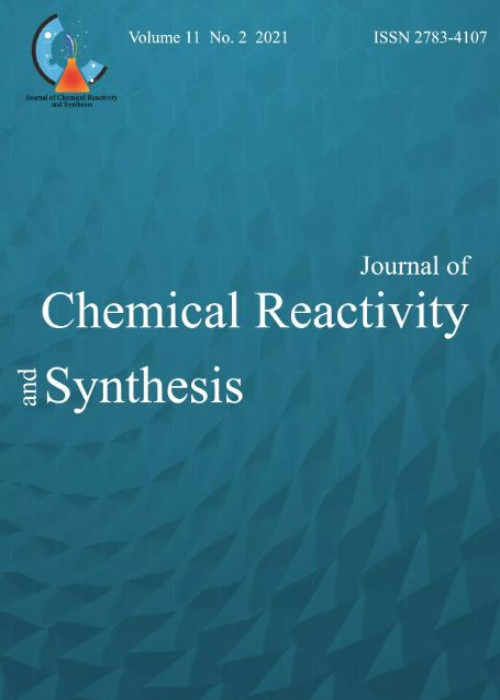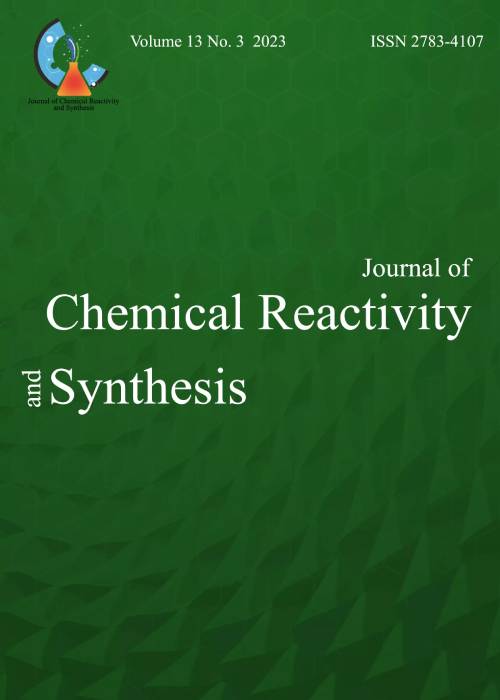فهرست مطالب

Journal of Chemical Reactivity and Synthesis
Volume:11 Issue: 2, Spring 2021
- تاریخ انتشار: 1400/03/11
- تعداد عناوین: 6
-
Pages 41-48Water is the most vital component of nature on which the life of all creatures, including humans, depends. But in recent decades, with the growing trend of the human population as well as industrialization, the entry of pollutants into running and groundwater has made it difficult to achieve optimal drinking water. One of the most important pollutants is nitrate and nitrite ions, which can have side effects when they enter the body. In this study, nitrate ion concentrations in different areas of Mashhad metropolis are compared and compared with the standard amount of the World Health Organization (WHO), and at the end, solutions to prevent it from entering the water are presented.Keywords: Water, drinking water, Water Pollution, Nitrate, Mashhad
-
Pages 49-54Multi-component reactions combine to form several synthetic steps without separating the interfaces or changing the conditions to produce the desired synthesis. Hence, such reactions have a special validity in organic and medicinal chemistry. Kojic acid and its derivatives are among the heterocyclic structures that due to their biological and pharmacological importance, research on the synthesis and properties of these compounds is one of the attractive fields of interest to many chemists and has a special place in organic and medicinal chemistry.Keywords: Multicomponent, Kojic acid, Heterocyclic compounds
-
Pages 55-61Medical nanotechnology is the study of nanotechnology methods and carriers for the diagnosis, prevention or treatment of diseases through the repair of damaged tissues at the molecular level. The goal of nanotechnology in medicine is to provide a solution for the diagnosis and treatment of diseases at the nanoscale.Targeted drug delivery is a set of activities that lead to the accumulation of drugs in a specific area of the body.Keywords: oral, Pulmonary, Respiratory, Intramuscular, Injectable polymer systems
-
Pages 62-90Metal nanoclusters have been considered as a new class of chemical sensors due to their unique electronic structures and the particular physicochemical properties. The interaction of N2 molecule with neutral and ionic magnesium nanoclusters , as well as neutral magnesium nanoclusters with the centrality of beryllium and calcium Mg16M (M=Be, Mg, and Ca) have been investigated using CAM-B3LYP/6-311+G(d) level of theory in the gas phase. The electronic properties of magnesium nanoclusters were significantly affected by the adsorption of N2 molecule. The NBO analysis revealed a charge transfer from the adsorbed N2 molecule to the nanocluster. Based on the adsorption energies and enthalpies, a thermodynamically favorable chemisorption process was predicted for the Mg16Ca—N2 complex. The negative value of the Gibbs free energy of Mg16Ca—N2 confirmed the spontaneous adsorption process. The estimated recovery time for Mg16Ca—N2 complex for 8-MR (0.089 s) and 4-MRs (0.075 s) illustrated a possible desorption process for N2 molecule from the surface of Mg16Ca. Our finding also revealed the Mg16Ca has the ability to use as a sensor for detection and absorption of N2 molecule.Keywords: Magnesium nanocluster, Adsorption, nitrogen, sensor, Electronic Properties, DFT
-
Pages 91-100An efficient and green protocol for the synthesis of tetrahydrobenzo[a]-xanthen-11-one derivatives by one-pot, three-component coupling reaction of aromatic aldehydes, dimedone, and 2-naphthol at 100 °C under solvent-free conditions in the presence of Co3O4 nanocatalyst is described. Cobalt oxide nanocatalyst was synthesized using a simple reflux method in an aqueous medium using a pyridinium-based ionic liquid, N-butyl pyridinium bromide. Morphology, structure, and particle size of Co3O4 nanocatalyst are characterized by FE-SEM, FT-IR, and XRD spectroscopy. The present methodology offers several advantages such as high yields, short reaction times, and simple workup.Keywords: Xanthene, Cobalt oxide, N- butyl pyridinium bromide, Ionic liquid, Nanocatalyst
-
Pages 101-117Microcapsules containing polyisocyanates such as TDI and IPDI have been considered for a variety of applications such as self-healing materials and coatings, prepare foams, composites, single-component adhesives, and most recently curing of polyurethane binder system. Interfacial polymerization in water-in-oil microemulsion is a quick and Inexpensive method for microencapsulation of polyisocyanates. In this paper, the effect of factors affecting the synthesis and properties of polyisocyanate microcapsules, include solubility of active hydrogen source in the oil phase to the water phase, type of monomer used, surfactant, solvent, synthesis temperature, stirring speed and emulsification time, on thickness, hardness, permeability and growth rate of the shell, as well as diameter, core fraction and particle size dispersion of microcapsules and reaction time have been investigated. The use of microcapsules containing polyisocyanate in various applications requires the satisfying of functional requirements. By controlling the factors affecting the process, microcapsules with the desired properties can be prepared.Keywords: Microencapsulation, Isocyanate, Self-healing, Interfacial Polymerization, Pot-Life


